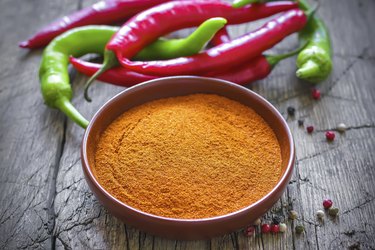
A jar of chile powder is a delicious spicy addition to any cook's cupboard. But what are the merits of cayenne pepper versus red pepper flakes, and what's the actual difference? Some people swear one specific type of chile tastes best, but it's really a personal taste.
Tip
Crushed red pepper might contain cayenne pepper, but could also contain any variety of hot red chile peppers. Choose the jar of spice that best suits your taste buds.
Video of the Day
Cayenne Pepper vs. Red Pepper
According to the University of Michigan, cayenne pepper is specifically the variety Capsicum frutescens, part of the Solanaceae family. Crushed red peppers are dried red peppers that are crushed into small flakes along with the seeds (the white bits you'll see in the jar) according to the University of Illinois. They might be any variety of hot chile pepper, but they can also be partially, or entirely, cayenne pepper.
Video of the Day
Nutritionally, the USDA groups cayenne and red pepper spices together: One teaspoon of either contains a mere 5.7 calories, and negligible amounts of sodium, making it a healthier flavor enhancer for your food than salt.
USDA analysis shows that cayenne pepper and crushed red pepper actually have more blood pressure-regulating potassium, at 2,010 milligrams per 100 gram serving, than bananas, which contain only 358 milligrams in a 100 gram snack. Generally, people only eat hot chiles in tiny quantities, relative to bananas, so it's hard to secure any real benefit from that.
Capsaicin Health Benefits
Chile peppers contain a compound called capsaicin, which may help relieve inflammation, according to Harvard Health Publishing. When weighing up cayenne pepper versus red pepper flakes, a test taste is your best bet to determine which has the most capsaicin. This chemical is the hot bit, so whichever sample tastes hotter, that one likely has more of this beneficial nutrient.
Research in the December 2019 issue of the Journal of the American College of Cardiology gives an intriguing hint that incorporating hot chiles into your diet might protect heart health. In the study, the diet habits and health status of more than 22,000 people from the south of Italy were followed for 8 years.
The results found that people who ate chile peppers more than four times each week were about one-third less likely to die of heart disease than those who rarely or never ate chile peppers.
A January 2017 analysis in PLOS One linked hot red chile pepper consumption with reduced mortality in an American population. It's possible that the chile eaters had other healthy habits that improve longevity, but the study proved an interesting correlation nonetheless.
A Metabolism Boost?
You've probably heard that crushed red pepper and cayenne pepper benefits can include a boost to your metabolism. This is accurate, according to University of Pennsylvania experts, as capsaicin triggers an increased release of heat energy when consumed.
However, the number of extra calories burned — even for people who eat spicy foods regularly — is thought to be minimal. But don't give up on hot chiles as a tummy trimming aid just yet: though the work is preliminary and the study was done using animals and not humans, scientists suggest that the spice might be able to influence body weight by modifying gut bacteria and, potentially, appetite.
In a mouse study published in the February 2020 edition of Food & Nutrition Research, capsaicin from hot peppers increased the number of helpful gut bacteria. This included those of the Akkermansia and Prevotella genera, which produce beneficial short-chain fatty acid concentrations that can impact hunger hormones.
Read more: 9 Herbs and Spices to Help You Lose Weight
Of course, it matters what foods you lace with a hit of cayenne pepper or crushed red chili pepper — you can't expect any weight benefit to outweigh the calories in a high-fat curry, for example. Try using the spice in a healthier dish, like LIVESTRONG.com's Yummy Turkey Quinoa Chili, or sprinkle it on some broccoli spears.
- University of Micihigan: "Cayenne"
- University of Illinois: "Shake on the Spice: Red Pepper Flakes"
- USDA: "Spices, Pepper, Red or Cayenne"
- USDA: "Bananas, Raw"
- Havard Health Publishing: "Chili Peppers: The Spice of a Longer Life?"
- Journal of the American College of Cardiology: "Chili Pepper Consumption and Mortality in Italian Adults"
- PLOS One: "The Association of Hot Red Chili Pepper Consumption and Mortality: A Large Population-Based Cohort Study"
- University of Pennsylvania: "Spicy Foods: To Eat, or Not to Eat"
- Food and Nutrition Research: "Capsaicin Has an Anti-Obesity Effect Through Alterations in Gut Microbiota Populations and Short-Chain Fatty Acid Concentrations"